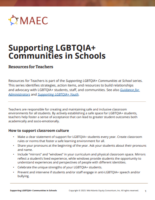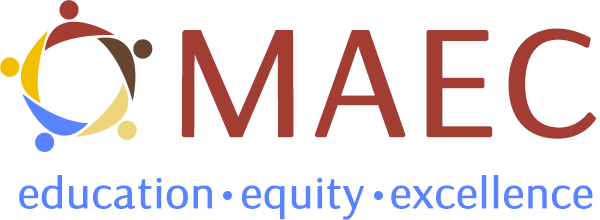
Download: Supporting LGBTQIA+ Communities - Teachers
Resources for Teachers is part of the Supporting LGBTQIA+ Communities at School series. This series identifies strategies, action items, and resources to build relationships and advocacy with LGBTQIA+ students, staff, and communities. See also Guidance for Administrators and Supporting LGBTQIA+ Youth.
Supporting LGBTQIA+ Communities in Schools
Resources for Teachers
Teachers are responsible for creating and maintaining safe and inclusive classroom environments for all students. By actively establishing a safe space for LGBTQIA+ students, teachers help foster a sense of acceptance that can lead to greater student outcomes both academically and socio-emotionally.
How to support classroom culture
- Make a clear statement of support for LGBTQIA+ students every year. Create classroom rules or norms that foster a safe learning environment for all.
- Share your pronouns at the beginning of the year. Ask your students about their pronouns and name.
- Include “mirrors” and “windows” in your curriculum and physical classroom space. Mirrors reflect a student’s lived experience, while windows provide students the opportunity to understand experiences and perspectives of people with different identities.
- Celebrate the unique strengths of your LGBTQIA+ students.
- Prevent and intervene if students and/or staff engage in anti-LGBTQIA+ speech and/or bullying.
How to collaborate schoolwide
- Help create a queer rights club, support group, or Gay-Straight Alliance (GSA). Offer your classroom as a meeting place.
- Include LGBTQIA+ students in conversations related to supporting them. Don’t underestimate the power of student voice.
- Familiarize yourself with school resources that can support LGBTQIA+ students, and make resources available. Consider looking into local LGBTQIA+ organizations that provide services to youth and children.
- Collaborate with your school counselor, nurse, social worker, and/or other mental health supports to ensure that LGBTQIA+ students have access to gender-affirming mental health resources.
How to participate in professional development and beyond
- Engage in professional development opportunities to further your understanding and continued support of the LGBTQIA+ community.
- Support legislation that supports LGBTQIA+ students’ rights.
- Advocate for curriculum that is inclusive of and uplifts the LGBTQIA+ community.
Selected resources
- 7 Non-Negotiables for Supporting Trans & Nonbinary Students in Your Classroom (Teach for America)
- Queer Youth Advice for Educators: How to Respect and Protect Your Lesbian, Gay, Bisexual, and Transgender Students (What Kids Can Do Inc.)
- Supporting LGBTQ Youth (National Education Association)
- Thriving, Not Just Surviving: How Teachers & Counselors Can Support Trans & Non-Binary Students at School (MAEC)
Authors: Allegra Kogan and Marianna Stepniak, MAEC
MAEC is an education nonprofit dedicated to increasing access to high-quality education for culturally, linguistically, and economically diverse students. The Center for Education Equity (CEE), a project of MAEC, is the Region I Equity Assistance Center funded by the U.S. Department of Education under Title IV of the Civil Rights Act of 1964. Our publications promote equitable education for the benefit of all students by identifying best practices as they have been developed over the years and in varying contexts. It is up to each school district, teacher, and student to figure out how best to align these best practices with their own experience to achieve their goals.
The contents of this guide were developed under a grant from the U.S. Department of Education under the Equity Assistance Centers Program. However, the contents of this guide do not necessarily represent the policy or views of the Department of Education, and you should not assume endorsement by the Department of Education or federal government, generally.
Copyright © 2023. Mid-Atlantic Equity Consortium, Inc. All rights reserved.
Suggested citation: Mid-Atlantic Equity Consortium, Inc. (2023). Supporting LGBTQIA+ Communities in Schools: Guidance for Administrators. Bethesda, MD. Edition: April 2023

